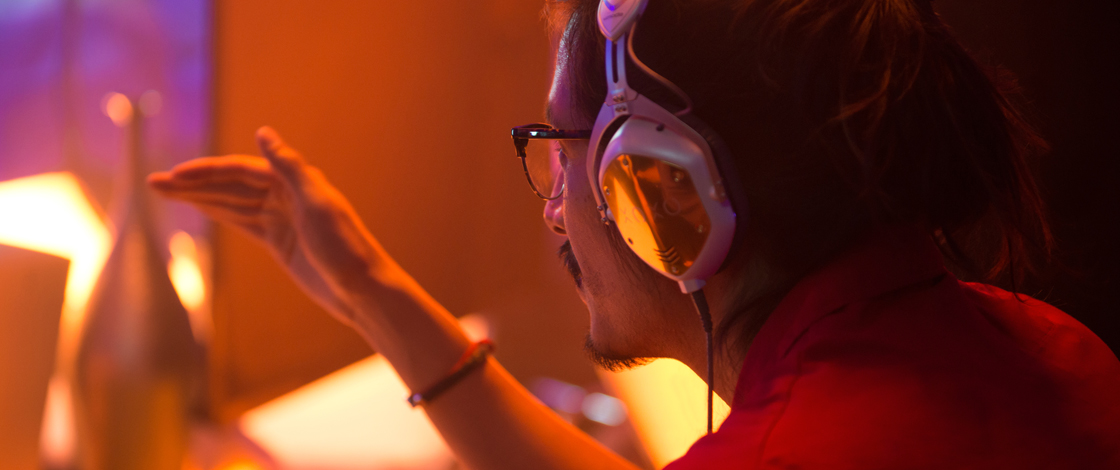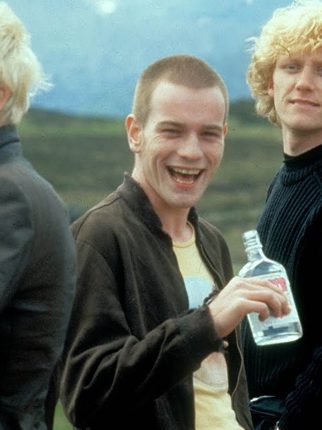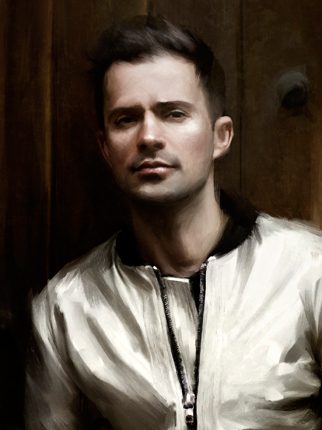XOXO: Time-Tripping With Director Christopher Louie

When we meet Christopher Louie, director of the Netflix-backed coming-of-age film XOXO, he is in the midst of splicing photos and video from his “raver years” into a short that “nobody is asking for.” However, he feels it is important—not only to allow potential viewers of his forthcoming feature to “connect with the roots” of the project, but to also let the masses know that Louie “isn’t just some dude who wants to capitalize on the mainstream attention being given to EDM” and the festival scene.
XOXO itself is billed as a modern-day coming-of-age story that “follows six strangers whose lives collide in one frenetic, dream-chasing, hopelessly romantic night.” Originally pitched as “Dazed and Confused set at a rave,” the feature-length film features Sarah Hyland (Modern Family) alongside a memorable ensemble cast of familiar and fresh-faced actors who together bring the larger-than-life experiences of a massive music festival to the screen.
Drawing from his own formative years as both a teenaged partygoer and DJ in warehouses and raves, Louie admits that the film not only draws upon his personal memories of the Southern California rave scene, but that a large inspiration for the film comes from the legendary status that Pasquale Rotella and Insomniac have achieved over the years. All of this is to say that, as Netflix prepares to unleash the film on its 80-million-plus members spread across 190 countries around the world, Louie understands the natural anxiety a project like XOXO stirs with its promised glimpse into a culture that Insomniac Headliners hold close to their hearts.

Partially to allay those fears, Louie opened up about his own history and experiences in a wide-ranging, in-depth chat that takes us from old-school raving memories all the way through lessons to be learned from the ill-fated Zac Efron EDM/DJ project, We Are Your Friends. With Pete Tong signed on as both music supervisor and one of the producers of the XOXO project, the curated soundtrack alone should let you know that Louie is determined to represent proper, as the likes of Galantis, Dada Life, Jack Ü, Grandtheft, Keyz N Krates, and Disclosure appear. As if that weren’t enough, Louie is already looking toward a future where XOXO can be transformed into an international brand where filmmakers from places like Mexico, India and Germany can bring to life fictional stories of Headliners from around the globe and the ways in which they come to commune with like-minded souls on the dancefloor.
You grew up in Orange County; at what point did electronic music come into your life, and how?
When I was 13, I remember seeing kids with cereal box backpacks on and thinking, what is that? At that point, I was a skater and into punk music—anything outside the mainstream appealed to me—so when I heard the music I was instantly hooked. Even before going to a rave, I decided to start dressing like a raver. I had the Sesame Street stuff—the big pants, all that—and then when I actually started going, it blew my mind. Unfortunately for me, the experience was definitely tied to drugs, and it started becoming more about drugs than the music, to the point that my life outside of raves started to suffer. I got kicked out of my honors classes, my parents pulled me from my high school and sent me to a private Catholic school, and that’s actually where I started finding all these correlations between religion and my experiences that I had at raves.

Were your parents religious?
I actually grew up in an atheist household, so it’s funny that they thought a private Catholic school would get me back on track. Religion class did provide an early frame for my experiences, but it was later at UCLA when I was studying sociology that I came across the ideas of [French sociologist Emile] Durkheim and this notion of “collective effervescence” that really helped me to see the connection between what he called “sacred practices,” like dancing, music and ritual, and the formation of a unified community or society.
What kind of music were you listening to back then?
When I first got into the music, it was through deep house, and then jungle, and then trance for a long time—before ultimately getting super into happy hardcore and DJing with my friend Bobby on four turntables. Looking back, that experience of going from a 14-year-old who didn’t know anything about the scene, to doing drugs and hitting bottom and then finding myself again through DJing at the age of 17—to experience all of that in three years was a huge formative experience for me, and one that I think is at the core of the movie.
At what point did DJing turn into something else?
I DJed, totally sober, until I was about 21. I used to play the Masterdome a lot, and once I got in with the promoters there, it was the best thing to happen to me. I was getting booked every single weekend, and I was getting paid! I wasn’t making a lot, but when you’re a kid, it’s cool to be able to get paid to do what you love doing. So, that helped me build a lot of confidence.
In terms of transitioning out of DJing—it’s such a weird story. Right around the time the happy hardcore scene was starting to die out, I was offered the chance to model internationally. I signed with Elite here in L.A., flew to Asia, and stayed there doing that for about six months. I remember going to deep house clubs in Hong Kong and thinking I had found my home again, only overseas this time. I came back to the States, and that’s when I got into UCLA.
At what point did you start making music videos?
Throughout all of this, I had been making my own music in Reason and making these really weird, experimental videos to go along with it. I started taking film classes at UCLA, and my professor, Bill Barminski, saw all this stuff that I’d made and thought that I had talent. So, I started assisting him on jobs, and we’d talk about ideas, and one of them was to do a story of a wooden robot that a scientist builds and falls in love with. We built the costume, did the video, and it ended up winning a contest and turning into an official Modest Mouse music video. We formally became a directing team under the name Walter Robot, and people started booking us for music videos, with each one leading to the next and the next.
It’s hard to believe that was almost 10 years ago! At what point did the idea for XOXO start percolating?
The idea came somewhere around 2012, when you could see electronic music coming back into the mainstream through Justice and that electro-house style out of France that was starting to blow up. That and that epic Tomorrowland recap video just made me feel like electronic music was back in a big fucking way and it was the right time to tell a story about my own experiences in a contemporary way. I pitched it as “Dazed and Confused set at a rave.”

This was your pitch to Netflix?
Actually, no—I met with Joel Zimmerman (the super-agent, not deadmau5), and he was a really big fan of my work and an early advocate for the project. We were actually pitching various music festivals—not only for access to shoot, but also to finance the movie. Ultimately, that strategy didn’t work, because a lot of the festivals we met with have a very specific vision for their brand, and they didn’t want to touch us because of the presence of drugs in the narrative of the film. My vision of the movie included the good and the bad, where the festivals just wanted the good; they didn’t want to hear about drugs or riots or that kind of thing.
When did the full script finally come together?
I wrote the treatment in 2013. We went out and pitched it; it didn’t go anywhere. So, at a certain point, I linked up with Dylan Meyer, who really brought everything together. The thing was, we finally had a script, everybody loved it, and nobody wanted to make the movie. Even after we connected with Pete Tong—who, by the way, has been fucking amazing—no one wanted to make it.

I had sold a show to Adult Swim that was just canceled. I had stopped doing music video work to focus on the movie, my girlfriend and I had just bought a house, I was quickly running out of money, and I remember having this conversation with my girlfriend. She was like, well, what do you want to do? I was like, I want to make the movie. And she was like, well, fucking do it. So I went out, got Joel to arrange limited access with a festival, paid for a Steadicam operator out of my own pocket, pulled together a few of the actors, and we went and shot a teaser movie.
Which festival was this?
I can’t say; we signed documents. But we got into this festival, and it was an amazing experience. I hadn’t been to a festival since EDC 2010 at the [Los Angeles] Coliseum. We shot the teaser [and] cut it together in a month. Netflix saw the teaser plus the script, and without even meeting me, they sent us a deal through email.
I guess the elephant in the room through all this had to be Zac Efron and We Are Your Friends. How did the critical response to that film affect your project?
We were pitching the script when that project got announced, and it created this kind of urgency, where we felt like we had to do our film before theirs. It’s really unfortunate what happened, though, as the movie just got torn to shreds. With Zac Efron being as big of a star as he is, I think maybe the audience discounted the film because they didn’t feel it was authentic, even though ultimately, the film came from an authentic place. Max [Joseph, the director] is so cool, smart, and obviously tapped into that generation—just look at the success he’s had with Catfish! But ultimately, that film didn’t inform any decisions on our end, because it literally came out the week that we wrapped. The train was moving, so to speak; there was no getting off at that point, even if I had wanted to. But seeing how it was received did make me think of how I had to do something on my own, to put myself out there so the film couldn’t be misconstrued as something else.

Ultimately, what message or lesson do you hope viewers take away from the film?
The core of the movie was always about having fun; this movie has to be fun and exciting. But once I got to editing the movie, the theme “jump, and the universe will catch you” just stood out. That ended up being the spirit I embodied while making it. Having to schedule six cast members with a small budget, getting into big festivals—sometimes with permission and sometimes without—shooting a film with 60,000 people who are totally unpredictable and uncontrollable, getting on mainstage at primetime when anything can go wrong…

I remember going up the stairs to the stage for the last shot and thinking, what if the cameraman falls? I know: I’ll get my phone and shoot it. The insanity and pressure of that moment made me realize that I was living the exact same moment as the character was in the movie. He only has one chance; this is his one shot, or everything is ruined if this doesn’t happen for him. That’s what it was like for me. It was the last shot of the movie—we’d gotten into this festival, we’d gotten permission to film on mainstage for 10 minutes—anything could go wrong at that point, and there was nothing we could do about it. I was like, holy shit, my life is here, this has to work out. I could do music videos or whatever, but I’d invested three years of my life into the project at that point, so that was the moment. I just had to jump and trust that it would all come together, and it did.
Now, I don’t mean that literally. I don’t mean, get an idea and think that it will magically happen. When I say jump, I mean jump and work your fucking ass off. Manage all of the potential failures properly, because they will happen. But once you go in, go all in, and don’t let anything else get in the way.
You can catch XOXO on Netflix starting August 26, 2016.
Follow XOXO on Facebook



